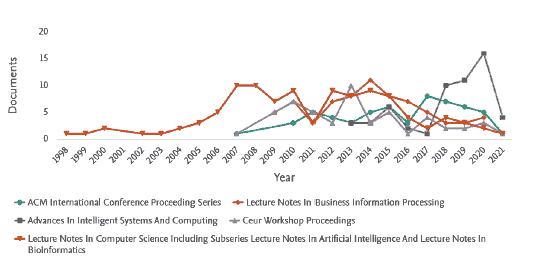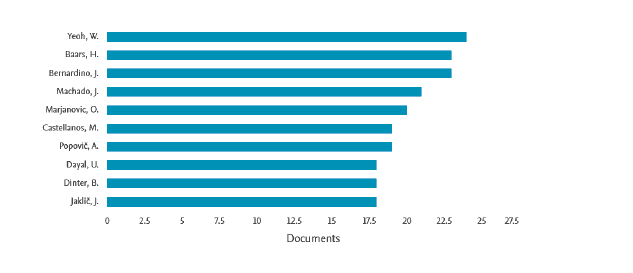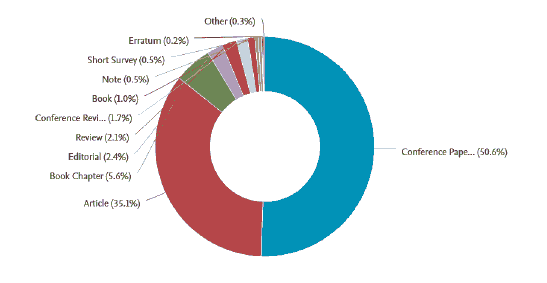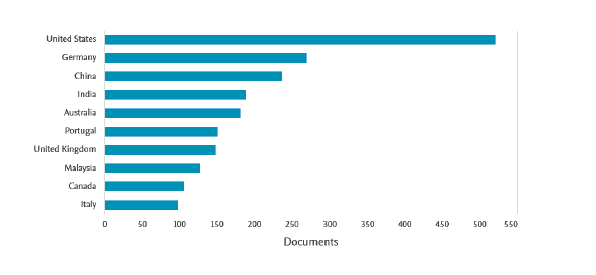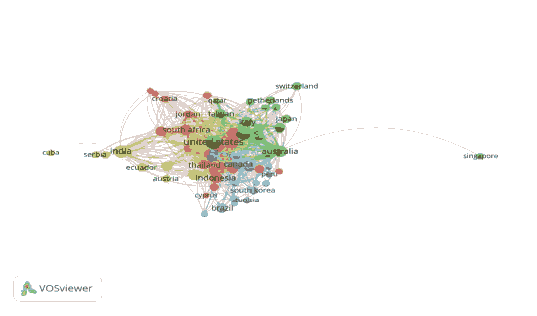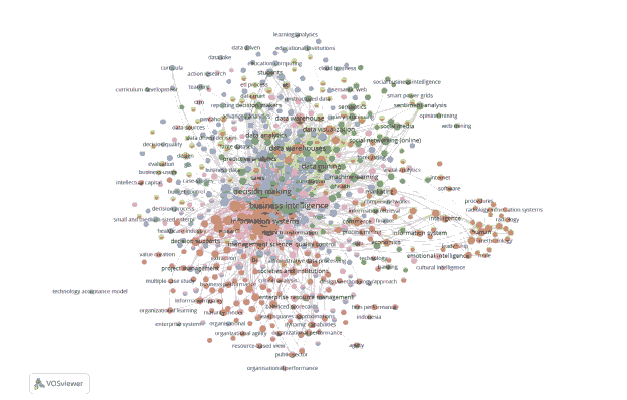Research Article: 2021 Vol: 24 Issue: 1S
Bibliometric Approach of Business Intelligence as Technical Infrastructure to Enhance the Organizational Performance, Competitiveness and Decision Making
Abdul Aziz Abdul Rahman, Kingdom University
Keywords:
Business Intelligence, Firm Performance, Competitiveness, Decision Making
Abstract
Today’s rapidly changing business environment needs effective business information systems in organizations. Business Intelligence (BI) practices bring together operating data with analytical instruments to offer intricate and useful information to developers and decision-makers. The purpose is to enhance the appropriateness and excellence of inputs to the decision-making process. BI is applied to comprehend the abilities existing in the organization; the state of the art, tendencies, potential trends in the markets, the know how’s, and the monitoring ecosystem in which the organization participates; and the activities of the rivals and the connotations of these actions. Several studies have been conducted that have examined the role of business intelligence in improving organizational performance, enhancing competitiveness, helping to make decisions, reduce costs, and many other factors. Current study sheds light on previous studies linking business intelligence systems and organizational performance and competitiveness in different sectors. This study relied on many studies that were carried out in this field during the years 1998 - 2021. About three thousand three hundred forty (3340) articles have been conducted in this field during the mentioned period were criticized to achieve the purpose of this study. These studies are almost categorized into six different areas that measure the role of business intelligence in improving them: Competitive advantage, cost reduction, critical success factors, decision-making, organizational performance, and sustainable growth of organizations. This study suggests conducting more studies to show the role of business intelligence systems in improving the performance of various sectors, especially service sectors”.
Introduction
Business intelligence is an umbrella under which falls a set of applications, infrastructure, tools and best practices that enable access to and analysis of data to extract information that helps in improving the decision-making process and superior organizational performance to reach superior performance and achieve competitively advantages for organizations (Abdul Rahman et al., 2020; Jasim et al., 2020; Abdul Rahman, 2019). Currently, business intelligence is a set of systems and tools that enable users of various positions within the organization to collect, store and analyze data and present it to users at the right time and appropriate form to help in making rational decisions that contribute to improving the organizational performance and enhancing its competitiveness (Hou & Papamichail, 2010). Organizations constantly work to devise new ways of serving customers that contribute to attracting and retaining them. This requires quick and immediate decisions based on a momentary view of the company as a whole. The availability of information when needed saves a lot of time for decision-makers and helps to make the right decisions at the right time (Aziz, 2020; Wieder & Ossimitz, 2015; Turban et al., 2011). On the other hand, traditional information systems are limited to providing annual reports to know the profits of a particular service or product or providing information about financial studies to find out the most profitable product at the end of the industrial stage or waiting for sales reports for a certain period to find out the suitability of a particular product or service for the population of a particular region. Business intelligence systems directly communicate with various data sources, then analyze these data and convert it into useful information in the form of graphs and dashboards that help to understand the current situation of the company and support the decision-makers to improve the organizational performance and increase its competitiveness (Asri et al., 2020; Abdul Rahman, 2017; Durrah et al., 2016). As a result of the changes that occurred recently in the internal and external environment of the organizations, businesses have witnessed great development. These changes in the environment led to increasing the competitiveness among organizations and the diversity of knowledge and culture. In line with that, several tools and systems emerged from the nature of the stage, as they represent success factors for organizations to survive and continue in the market. One of these tools and systems is business intelligence systems, which currently play an important role in the sustainability of organizations' performance considering the challenges they face (Asri et al., 2020).
Under the Fourth Industrial Revolution, great technological progress has led to a remarkable improvement in how organizations work. The scope of innovation has expanded, and the growing automation technologies have accelerated, which has been making great efforts to embrace these technologies and use them in supporting the decision-making and improving organizational performance and competitiveness. Key assets of the Fourth Industrial Revolution include artificial intelligence, blockchain, financial technologies, robotics, data analytics, and business intelligence. This revolution will continue to touch every aspect of our daily lives. Both artificial intelligence and business intelligence have become a pillar of change in organizations. At the heart of this transformation, technologies for data analytics generate the data needed to make decisions so that these technologies have become a basis for business intelligence, which is a mainstay for obtaining an in-depth view of business and institutional processes and a better understanding to ensure the possibility of advancing these businesses by improving the organizational performance and enhancing its competitiveness (Asri et al., 2020). On the other hand, several businesses are using artificial intelligence and business intelligence to better understand the customers’ mindsets and their purchasing behavior. This will enable the sellers to provide a distinguished shopping experience to customers and give them the options that best match their tastes based on the data collected about them while they are in the store. The current study is based on a review of previous studies to identify the role of business intelligence systems in improving the organizational possibility in collecting the necessary information that will help in enhancing the organizational performance and competitiveness and also in making good decisions about all activities of the organization and at all levels.
Research Methodology
The main purpose of this study is an in-depth understanding of the previous studies related to business intelligence and its role in improving organizational performance and enhancing competitiveness. The bibliometric review has been undertaken considering documents published with Scopus indexed journal with keywords, Business intelligence, Decision making, firm performance, competitive advantage and others. The analysis based on Country, Citation, Author, year and source of publication has been considered for the results. The visualization tool VOS viewer is considered to present the results visually. This study follows the bibliometric approach by analyzing the publication of the previous studies on the role of business intelligence in improving organizational performance, decision making, competitiveness and others. This study will be based on the preliminary search of the literature conducted in recent years on the subject of the study and will rely on articles published in highly rated international journals. This study relies on articles that include business intelligence and organizational performance, business intelligence and organizational competitiveness, business intelligence and decision-making, business intelligence and critical success factors, business intelligence and cost reduction, business intelligence and sustainable growth of organizations, and other related articles.
Results and Discussion
A total of 3,340 articles were reviewed. These articles were conducted over the years between 1998-2021 as shown in Figure 1. All these articles are related to business intelligence and its role in improving performance, competitiveness, decision-making, growth, sustainability, and other areas.
Figure 1 presents documents published in various international conferences, lecture note, and different workshop proceedings. Finding exposes since 1998, lecture notes in computer science including subscribers lecture notes are maintaining consistency. Similarly, BI documents in advances in intelligence system and computing reached more than 16 during 2020 which was a highest in compered to rest of the sources since 1998.
Figure 2 states document by to 10 authors, title (business AND intelligence), Yeoh, W. 25 article cited in Scopus. The top 2nd and 3rd authors-maintained consistency in maintaining consistency 23 documents. As per the overall outcome, the total number of articles published in Scopus is 3,340 documents.
Figure 3 emphasize on documents by type different mode of publication under BI. Majority (50.6%) of the publication entitled BI is in conference, followed by article, and book chapter. The figure also notifies editorial, short survey and erratum published under this title.
Figure 4 presents documents by country or territory. This results states, United states in the highest number of published countries in BI with 521 documents, followed by Germany 279 documents, China 237, and India 189. Results also exposes certain country with single digit publication for example, Albania, Botswana, Brunei Darussalam, Kyrgyzstan, Sudan etc.
Figure 5 presents visualization of citation by county. This Visualization consists of 65 items with 4 cluster, 701 links and 2268 documents. The clusters have been classified with Cluster 1 with red color, 2 with green, 3 with blue and 4 with yellow. Figure shows Cluster 1 consists of 21 items, 2 with 8 items and Cluster 3 with 16 items and Cluster 4 with 10 items. France linked 30 items with 52 documents, Cluster 2 United States with highest link (56) consists of 523 documents, cluster 3 Saudi Arabia with 38 links and 33 documents, and Cluster 4 Portugal with 44 documents with 113 links.
Figure 6 presents word cloud by key words. The Vos viewer explores BI has strongest co-citation with decision making keywords followed by information system, management science, data mining, data warehouse, big data, decision support, metadata in red and blue cluster. Similarly, data mining and BI in green cluster consists of keywords, social networking, machine learning and decision support system in orange cluster.
On the other keywords like management support system, data visualization, data semantics are also connected to BI with different cluster. BI has been associated with economics with decision making and investment keywords.
Business Intelligence and Organizational Benefits
The mentioned 3340 articles adopt different methodologies and were conducted in the time period between 1998-2021. These articles varied in their methodologies like survey, case study, literature review, and other methodologies. On the other hand, the 3340 articles tested the relationship between business intelligence and different areas such as such as competitive advantage, cost reduction, critical success factors, decision-making, organizational performance, sustainable growth of organizations, and some other areas. In the coming pages, each of the six areas mentioned above will be considered and how it is affected by business intelligence will be highlighted.
Business Intelligence and Competitive Advantage
Business intelligence is a business information system that integrates many databases generated within the organization and this system classifies and analyzes that data and presents it to decision-makers at the right time and appropriate form. The industry 4.0 demands high competitiveness with effective resources. The ongoing technology and resource enhancement expect organizations to keep themselves self-ready to face all kinds of challenges. Considering these views in mind, effective BI in the organization can generate a better competitive advantage for the organization. This data serves many operations, such as comparisons between the organization's data for several periods, as well as between the organization's data and its competitors' data. Business intelligence helps to gain a competitive advantage by providing the necessary information to compare the organization’s performance with its competitors (Rouhani, et al., 2016). Thus, it allows the organization to work on improving the competitive position of the organization so as to outperform its competitors and gain a competitive advantage (Karim, 2011; Guarda et al., 2013).
English & Hofmann (2018) believe that business intelligence also supports Small And Medium Enterprises (SMEs), by providing these companies with the information needed to compete with their competitors and achieve a competitive advantage over them.
Jasim, et al., (2020) indicate that business intelligence is a driver of competitive advantage, and therefore the organization should focus on different aspects of business intelligence such as marketing intelligence, competitor intelligence, social and strategic intelligence about the competitive environment, and the technological intelligence, which directly improves the organizations' competitive advantage.
Business Intelligence and Cost Reduction
Through the analysis of cost items and their behavior as well as the analysis of the activities that cause costs within the organization, it is possible to identify the causes of costs. The advanced technology and availability of various sources to reduce the cost is one of the most suitable solutions and outcomes of BI. As stated in previous findings, B1, artificial intelligence, machine learning, and different advanced pieces of technology usually provide necessary information and cost reduction techniques to the organization. This outcome is possible only if system maintain effective BI. For example, the company can control the inventory and see what the most demanded products are and what are the least selling and stagnant products in the organization’s stores, to reduce them and thus reduce the cost of storage. The organizations can also analyze the cost of each activity and the number of times it is performed, thus linking the costs of each activity to its outputs will give a better view of the efficiency of each activity within the organization and thus immediate actions to reallocate resources to those activities that add value to products and services from the customer's perspective and to exclude activities that don’t add value from the customer's perspective (Grytz & Grimberghe, 2018). For example, relying on the Just-in-Time (JIT) model enables the organizations to reduce inventory to zero by linking all customer orders to the procurement of raw materials to production lines on time, as well as delivering finished products to customers directly without transferring them to stock. Business intelligence systems allow reducing costs since they keep detailed data on all transactions within the organization. Business intelligence also allows reducing the cost of purchases by selecting the best supplier based on previous data on the dealings with those suppliers. Business intelligence has a positive impact on cost reduction in construction project management (Mandi?ák et al., 2016).
Business Intelligence and Critical Success Factors
The critical success factors have different variables which contribute to an organization with various positive results. BI is one of the most influential factors that contribute to organizational success. The outcome of this review notifies the key indicators of various success factors which have a direct impact on business intelligence. According to some studies, business intelligence clearly contributes to the organization's Critical Success Factors (CSFs) (El-Adaileh & Foster, 2019). Other studies identify that business intelligence plays a significant role in improving critical success factors such as project management, management support, and user engagement (Ravasan & Savoji, 2019; Gaardboe & Svarre, 2018). Some other studies confirm the existence of a direct relationship between business intelligence and the improvement of some other success factors such as information quality, system quality, usage, net benefits, and user satisfaction. The study also indicates that effective business intelligence reflects in other critical success factors such as vision and strategy, organizational culture, competency development, and organizational structure (Eryadi & Hidayanto, 2020).
Business Intelligence and Decision Making
Under business intelligence, all levels and departments of an organization have instant access to the information needed to make quick and rational decisions (Azeroual & Theel, 2018). BI always takes a critical role in the decision-making process by providing timely and opt information to the strategic level management. Numerous studies reveal that effective BI enhanced the impact of decisions on the growth of an organization. The business intelligence system transforms the collected data into meaningful information that helps in making the right decisions, implementing the selected strategies, and achieving the predetermined goals (Cheng & Cheng, 2011). For example, business intelligence helps in showing sales trends according to customers' desires and preferences, how customers feel about promotions, data about online shopping, customers' buying behavior, and factors that affect the level of sales. By analyzing these results, the organization can decide which products to focus on, which customers to be retained, and which suppliers to buy from. Through business intelligence data, the organization can make better promotional strategic decisions (Aziz, 2020; Wieder & Ossimitz, 2015).
Determining customer preferences enables the organization to make quick marketing decisions that help increase the sales volume by designing campaigns and promotions that help the organization achieve its goals (Lahbi, 2018). Business intelligence data also allow using marketing strategies with lower marketing costs and higher return on investment (Elbashir, et al., 2008).
Business intelligence helps in simplifying the processes within the organization. For example, in the field of employee management, the concerned manager can identify better ways and strategies to improve employee productivity, reduce employee turnover or simplify the hiring process. Thus, the organization's management can take important operational decisions that contribute to achieving the goals set in a lower time and higher efficiency (Rouhani et al., 2016).
Business intelligence also facilitates inventory processes and inventory decisions as well. For example, business intelligence can monitor cost flow inventory and determine the most active and stagnant items as well, and then determine the amount of demand and optimal demand times. This helps in planning purchases and taking the opportunity to benefit from quantity and price discounts (Sundjaja, 2013; Azeroual & Theel, 2018).
Preparing the financial statements through business intelligence enables the organizations to identify the annual profits and the cash inflows and outflows, which help in planning to borrow and make appropriate decisions about the company's future financial position. Business intelligence can also assess the financial status of each production line or organization’s branch, which helps in making decisions around choosing the best sales mix or making decisions on keeping the company's branches or not (Azeroual & Theel, 2018).
Business Intelligence and Firm Performance
Organizations currently rely heavily on business intelligence to improve their performance, but often, this initiative is not aligned with the Business Process Management (BPM). One of the key indicators in organizational performance is to have external information in a related industry and macro-level information data collection. The outcome of the review noticed two major levels of information, mainly the past research and finding and reviews of those in publications. Several studies indicate that business intelligence has a clear positive impact on organizational performance (Elbashir et al., 2008). Business intelligence allows measuring the performance of operations of various types and at all levels within the organization. Improving the performance of an organization is critical and improving performance also is not only about increasing profitability but it includes the ability to survive in a rapidly evolving competitive environment (Mesaros et al., 2016; Abdul Rahman et al., 2021). Business intelligence and information technology play a great role in operations and performance management within organizations. Business intelligence provides the information necessary to make decisions in a timely manner so that business intelligence facilitates the decision-making process by providing data and analyzing it at all levels, whether inside or outside the organization. Other studies indicate that the use of business intelligence in the development of product design will lead to an increase in the demand for these products and thus increase sales volume and accordingly increase the profitability, which will inevitably improve the overall performance of the organization and enhance its competitiveness (Asri et al., 2020; Abdul Rahman & Hamdan, 2017). Business intelligence also helps in making decisions quickly and with great flexibility, as it works to reduce the time needed for communication between the different departments within the organization.
Some studies conducted on commercial banks operating in Kuwait concluded that business intelligence analyzes data and transforms it into important information that helps in achieving the organization's strategic goal (Al Merri, 2020). The results explored the importance of BI in achieving organizational goals.
The results of a study conducted on commercial banks in Kenya indicate that strategic intelligence is of great importance to the performance of commercial banks. Also, the same study proves that financial and non-financial performance measures have a major role in improving the performance of the banking sector and the growth of the Kenyan economy as well (Kori et al., 2020; Owusu, 2017).
Another study showed that artificial intelligence can improve operations by providing the necessary information to improve performance at various financial, marketing, administrative and operational levels as well. The results of some studies also show that companies are improving their performance using artificial intelligence (Taguimdje et al., 2020; Taguimdje et al., 2020).
Business Intelligence and Sustainable Growth
Organizations currently operate in a highly complex competitive environment, especially with regard to decision-making. Operating in this complex environment requires organizations to make quick and timely decisions to respond to unexpected circumstances. Making quick decisions requires the availability of quick and appropriate information to make these decisions. The development of competitive intelligence systems within organizations will provide the necessary information for the decision-making processes and thus ensure the sustainability of the organization's growth (Stefanikovaa et al., 2015).
The competitiveness of organizations is currently governed by the extent of the organization's ability to process data and transform it into information that helps in making decisions that contribute to achieving the organization's competitive advantage. Business intelligence systems collect data from different centers spread within the organization or in its branches distributed over multiple geographical areas, and then these systems analyze the collected data and transform it into information that helps the organization achieve its goals (Preko & Kester, 2015).
One more study conducted in Poland to show the role of business intelligence in improving the financial position of commercial banks. The results showed that business intelligence has a significant positive role in improving the financial position of these banks. This positive effect is reflected in many areas such as profitability, quality of assets and liabilities, and debts. The same study also showed that business intelligence has an important role in improving financial performance indicators and banking sustainability (Tunowski, 2020).
Conclusion and Recommendations
This study included an in-depth review of 3340 articles focused on the impact of business intelligence on organizational performance, the competitive advantage of organizations, decision-making, and other areas. The discussion dealt with an explanation of the impact of business intelligence on each of the mentioned areas. The results of the discussion indicate that business intelligence has an important and real role in improving organizational performance and enhancing their competitiveness, improving the decision-making process as well as the growth and sustainability of organizations. The results emphasize that business intelligence is no longer an option, but rather an urgent need for organizations to maintain their presence in the highly competitive and changing business environment. Considering that business intelligence has become of great importance to all organizations, there are other opportunities for further researches in this field, especially in the field of studying the impact of business intelligence on the performance of service organizations. The growing volume of data has become a necessity and basis for strategic planning within organizations, as business intelligence systems provide the information needed to make better decisions and to improve organizational performance in a timely and appropriate manner.
These results also explored considering the publication indexed in Scopus indexed journal and the analysis has been presented to highlight the publication from various different authors, territory, years, and so on. The result presented various keywords aligned with the business intelligence and decision-making process, competitive advantage, performance, and others. The outcome of the four clusters explored key findings and observations of the published article. The study recommended future research to consider business intelligence with aligned Artificial intelligence and machine learning. The current study noticed, BI and AI studies in recent published data. Therefore, future research on these subjects could contribute productive outcomes for bibliometric analysis.
Acknowledgement
The authors would like to acknowledge the support rendered by the Research Unit of Kingdom University and University Management for their constant assistance with the research. This work was written by Abdul Aziz Abdul Rahman, Kingdom University, Bahrain, Email: a.abdulrahman@ku.edu.bh
References
- Abdul Rahman, A.A.A. (2017). The relationship between solvency ratios and profitability ratios: Analytical study in food industrial companies listed in Amman Bursa. International Journal of Economics and Financial Issues, 7 (2), 86-93.
- Abdul Rahman, A.A.A. (2019). The impact of strategic planning on enhancing the strategic performance of banks: evidence from Bahrain. Banks and Bank systems, 14(2), 140-151.
- Abdul Rahman, A.A.A., & Hamdan, H.M. (2017). The relationship between total quality management and firm’s comprehensive performance: An empirical study. The Arab Journal of Accounting, 20(1), 120 – 138.
- Abdul Rahman, A.A., Meero, A., & Mansur, H. (2020). Examining the impact of environmental management accounting on achieving sustainable competitive advantages. Academy of Accounting and Financial Studies Journal, 24(6), 1-12.
- Abdul Rahman, A.A., Meero, A., Zayed, N.M., Islam, K.M.A., Rabbani, M.R., & Bunagan, V.D.R. (2021). Impact of leverage ratios on indicators of financial performance: Evidence from Bahrain. Academy of Strategic Management Journal, 20(S3), 1-12.
- Al Merri, H.S. (2020). The impact of business intelligence on strategic performance in commercial banks operating in the state of Kuwait. International Business Research, 13(8), 91-99.
- Asri, D.A.A.M., & Abdul Mohsin, A.M.B. (2020). Competitive intelligence practices and organizational performance linkage: A review. Jurnal Intelek, 15(2), 101-115.
- Azeroual, O., & Theel, H. (2018). The effects of using business intelligence systems on an excellence management and decision-making process by start-up companies: A case study. International Journal of Management Science and Business Administration, 4(3), 30-40.
- Aziz, M.N. (2020). The impact and power of Business Intelligence (BI) on the decision-making process in uppsala university: A case study. International Journal of Science and Business, 4(6), 78-87.
- Cheng, L., & Cheng, P. (2011). Integration: Knowledge management and business intelligence. 2011 Fourth International Conference on Business Intelligence and Financial Engineering (BIFE), 307–310.
- Durrah, O., Abdul Rahman, A.A., Jamil S.A., & Ghafeer N.A. (2016). Exploring the relationship between liquidity ratios and indicators of financial performance: An analytical study on food industrial companies listed in Amman Bursa. International Journal of Economics and Financial Issues, 6(2), 435-441.
- El-Adaileh, N.A., & Foster, S. (2019). Successful business intelligence implementation: A systematic literature review. Journal of Work-Applied Management, 11(2), 121-132.
- Elbashir M.Z., Collier, P.A., & Davern, M.J. (2008). Measuring the effects of business intelligence systems: The relationship between business process and organizational performance. International Journal of Accounting Information Systems, 9, 135–153.
- English, V., & Hofmann, M. (2018). Business intelligence as a source of competitive advantage in SMEs. Article in DBS Business Review, 1-24.
- Eryadi, R.A., & Hidayanto, A.N. (2020). Critical success factors for business intelligence implementation in an enterprise resource planning system environment using DEMATEL: A case study at a cement manufacture company in Indonesia. Journal of Information Technology Management, 12(1), 67-85.
- Gaardboe, R., & Svarre, T. (2018). Business intelligence success factors: A literature review. Journal of Information Technology Management, 1, 1-15.
- Grytz, R., & Grimberghe, A.K. (2018). Business intelligence & Analytics cost accounting: Review and synthesis of the literature. Twenty-Second Pacific Asia Conference on Information Systems, Japan.
- Guarda, T., Santos, M., Pinto, F., Augusto, M., & Silva, C. (2013). Business intelligence as a competitive advantage for SMEs. International Journal of Trade, Economics and Finance, 4 (4), 187-190.
- Hou, C., & Papamichail, K.N. (2010). The impact of integrating enterprise resource planning systems with business intelligence systems on decision-making performance. International journal of technology, policy and management, 10(3), 201–226.
- Jasim, H., Sulaimanb, Z., & Zakuanc, N. (2020). Influence of competitive intelligence success on business competitive advantage: A conceptual framework. International Journal of Innovation, Creativity and Change, 11(12), 795-807.
- Karim, A.J. (2011). The value of Competitive Business Intelligence System (CBIS) to stimulate competitiveness in global market. International Journal of Business and Social Science, 2(19), 196-203.
- Kori., B.W., Muathe S.M.A., & Maina, S.M. (2020). Financial and Non-Financial measures in evaluating performance: The role of strategic intelligence in the context of commercial banks in Kenya. International Business Research, 13(10), 130-142.
- Lahbi, H. (2018). The power of business intelligence on the decision-making process at Linkoping University. Master’s thesis in business administration strategy and management in international organizations, 1-100.
- Mandi?ák, T., Behúnová, A., & Mesároš, P. (2016). Impact of implementation and use of business intelligence on cost reducing in construction project management, Acta Tecnología. International Scientific Journal about Technologies, 2(3), 5-11.
- Mesaros, P., Carnicky, S., Mandicak, T., Habinakova, M., Mackova, D., & Spisakova, M. (2016). Business intelligence impact on corporate performance in Slovak enterprises–A case study. Journal of Systems Integration, 4, 9-18.
- Owusu, A. (2017). Business intelligence systems and bank performance in Ghana: The balanced scorecard approach. Cogent Business & Management, 4, 1-22.
- Preko, M., & Kester, Q.A. (2015). The study of the impact of business intelligence in the banking industry of Ghana. International Journal of Emerging Research in Management &Technology, 4(8), 31-36.
- Ravasan, A.Z., & Savoji, S.R. (2019). Business intelligence implementation critical success factors. IGI Global, 112-129.
- Rouhani, S., Ashrafi, A., Ravasan, A.Z., & Afshari, S. (2015). The impact model of business intelligence on decision support and organizational benefits. Journal of Enterprise Information Management, 29(1), 19-50.
- Stefanikovaa, L., Rypakovaa, M., & Moravcikovaa, K. (2015). The impact of competitive intelligence on sustainable growth of the enterprises. Procedia Economics and Finance, 26, 209-214.
- Sundjaja A.M. (2013). Implementation of business intelligence on banking, retail, and educational industry. International Journal of Communication & Information Technology (CommIT), 7(2), 65-70.
- Taguimdje, S.L.W., Wamba, S.F., Kamdjoug, J.R.K., & Wanko, C.E.T. (2020). Influence of Artificial Intelligence (AI) on firm performance: The business value of ai-based transformation projects. Business Process Management Journal, 1-45.
- Taguimdje, S.L.W., Wamba, S.F., Kamdjoug, J.R.K., & Wanko, C.E.T. (2020). Impact of artificial intelligence on firm performance: Exploring the mediating effect of process-oriented dynamic capabilities. The XIII Mediterranean Conference on Information Systems The XVI Conference of the Italian Chapter of AISAt: NAPLES, 38, 1-18.
- Tunowski, R. (2020). Sustainability of commercial banks supported by business intelligence system. Sustainability, 12 (4754), 1-17.
- Turban, E., Sharda, R., & Delen, D. (2011). Decision support and business intelligence systems. Boston: Prentice Hall.
- Wieder, B., & Ossimitz, M.L. (2015). The impact of business intelligence on the quality of decision making–A mediation model. Bernhard Wieder and Maria-Luise Ossimitz/Procedia Computer Science, 64, 1163–1171.
